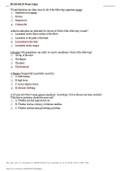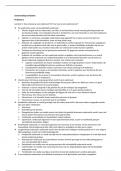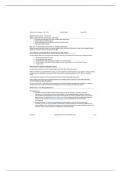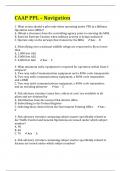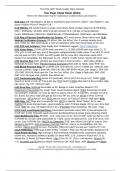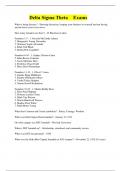1.1 Prophecy regarding the Messiah
Prophecy - a message inspired by God, a form of revelation. A person who passes on the
prophecies is a prophet. It comes in different forms:
● Writing
● Through angels
● Visions
● Mental guidance
Can be interpreted in different ways:
● Someone who believes the prophecies are already fulfilled
○ Preterist
○ Believed the OT prophecies are talking about…
■ God’s anger for their sinful ways
■ Hope that a better king would save and restore a new religion
■ Warnings about the Jews being overthrown by rival empires
● Someone who believes they are yet to be fulfilled
○ Futurist
○ Believed the OT prophecies are talking about…
■ God’s future destruction of sinners on Judgement Day
■ Future empires that will persecute God’s people
■ Predictions of Jesus as the future saviour
The messiah - Referred to as the chosen one to save God’s people, comes from the hebrew word
Mashiach meaning ‘the anointed one’. Kings, prophets and priests were anointed, including:
● Judas Son of Hezekiah
● Simon of Perea
● King Herod Agrippa
Due to all the interpretation, Jews (1st century) had different ideas of the Messiah:
● Kingly
○ Jews expected a future king to be the messiah, from the line of David who would
drive out the occupying Romans to set up a Jewish state.
■ The Line of David is important as he ruled fairly and wisely
○ Others hoped for supernatural king to defeat evil spirits.
● Priestly
○ Ordinary Jews paid taxes and sacrificed animals for the priests, some Jews looked
forward to a Messiah which would restore priesthood for holier worship.
○ Priesthood was seen as corrupt and collaborating with Romans the Messiah would
reform this, abolish the temple and make an accessible place to worship.
● Prophetic
○ A great prophet who would guide nation back to God
○ They lived in a confusing time… Hellenistic culture (Greek), but ruled by Romans
○ Moses promised a prophet who would teach people to worship and be good Jews.
● Suffering
○ Christians claim Jesus was all the above types of messiah but also a suffering
Messiah who died an atoning death (dying for others sins)
○ Isaiah 53 refers to the song of the suffering servant of which Jesus fulfills.
The Messianic Age - a new age of peace on earth, an end of war where the Jews would return to
Palestine and no more suffering or evil, and all natural enemies are reconciled (Isaiah 11:6)
The line of David - David led the resistance against the cruel king Saul and became king. He made
Jerusalem the capital. David fell when he fell in love with a married woman, his family was split and
there was a war over his kingdom before he died. “Golden age” of just ruling and pure religion.
The Davidic royal line - he left behind a unified Israelite kingdom that was inherited by his son,
Soloman, who built the first temple in Jerusalem, and continued the Golden Age. His death
triggered another civil war, splitting the kingdom into 2 smaller states: Judah (south) and Israel
,(north). Judah outlasted Israel, the Babylonians laid siege to Jerusalem and destroyed the city and
temple. The last Davidic king was Zedekiah who tried to rebel, but failed.
The “Son of David” - The Davidic royal line failed and died out but many believed it still existed but
no king appeared. The people longed for a true Son of David, who embodied his fine qualities,
after the destruction of Judah, the hope intensified. But in order for this return:
● Must be religious purity and a return to pure worship.
● Military action - the Son of David would lead the rebellion against the Romans.
The suffering servant - Isaiah’s life as a prophet began after a religious experience in the temple,
he had a vision of God on his throne, smoke and noise filled the temple (numinous experience). He
had a mission to deliver the news that God is angry. It predicts military defeat, slavery and
humiliation for Judah, Jesus stated that he wants people to live morally for the Messianic Age.
● Christian interpretations
○ Predicts the Messiah, a suffering Messiah who died an atoning death
○ Saint Jerome said Isaiah “described all of the mysteries of the church so vividly, you
would assume he was not prophesying, but composing a history of past events”
● Jewish interpretations
○ Don’t see the suffering song as predicting Jesus, or that he was the Messiah
○ The servant is symbolic of Israel, for those who suffered in the exile to Babylon. God
refers to Israel as his servant (Isaiah 41:8)
○ Jews were sent to be a light to the gentiles, but were mocked and killed.
■ Morner Hooker agrees, “Israel, who has been chosen by God as his servant,
is to be restored from banishment and will manifest God’s glory to all
nations”
● Agreements:
○ Treat the servant as a corporate personality, meaning a single person symbolised
the experience of a big group of people
Messianic secret - theme of biblical criticisms developed by Wilhelm Wrede, who suggested that
Jesus never claimed to be the Messiah and didn’t want people to know. He believed this to be true
after studying the gospel of Mark. He didn't set himself up as a King or a Prophet, didn't try to free
the Jews from Roman rule; instead he taught a message of God's love and forgiveness and he
died a very unmessianic death on the Cross. Later Christians believed Jesus had been resurrected
and that he was the Messiah. This meant that the Christians had very different beliefs about Jesus
from Jesus' own friends and family and ordinary followers. When Mark was written, those followers
and family were still around; they objected to calling Jesus the Messiah because they knew what
Jesus was like and how he never made this claim. Mark and some Christians replied that Jesus
had claimed to be the Messiah but he had done so secretly.
The theory is based on Markan priority. In Matt and Luke, Jesus’ follower had died and the gospels
aren’t secretive about Jesus being the Messiah.
Different interpretations:
● Jesus referred to himself as the Messiah
○ There is one occasion where he calls himself the Messiah, and 4 other occasions
where he accepts the title.
● Jesus never claimed to be the Messiah
○ The Gospels writers had written their accounts after the events, after they have
already concluded that Jesus was the Messiah, then inserted the texts to make it
clear who Jesus really was.
○ Mark then created the Messianic secret to show why Jesus was not regarded as the
Messiah in his lifetime.
○ “If he believed himself to be in any sense the Messiah, the last thing he would do is
claim the title for himself” - Morna Hooker
● Jesus believed he was but never claimed to be the Messiah
, ○ Didn’t want to be misunderstood (due to all the expectations and assumptions about
the Messiah, they would only be disappointed), Drane states that he “offered clues
to his identity as the Messiah for those who are prepared to think more deeply”
The disagreements has lead to “a tension in the belief of the early church of Jesus as Messiah and
the un-messianic character of Jesus’ ministry” - Morner Hooker
Wrede’s theory was challenged by M. Hooker...
● Not everyone accepts Markan priority, many Catholics though Matt was first, which doesn’t
contain secrecy theme and can conclude the Messiah information wasn’t added later.
● Good reasons for Jesus to keep it a secret (he has a christological mission and didn’t want
the attention to be taken away from his main meaning)
● People will misunderstand if Jesus admitted to being the Messiah, the people have
expectations, such as overruling the Romans for the Jews.
Proof texts - references to the OT that attempt to prove Jesus is the Messiah. Matt uses these to
show that Jesus is the Messiah. M. Hooker says that Matt is the “prophetic key” referring to Jesus
as the Messiah and second Moses. R. Brown states that Matt addresses 2 audiences.
● The Jews were interested with Jesus being a descent from David
● Gentiles as a descendant from Abraham would bring a ‘blessing to all people on earth’.
Different proof texts:
● The birth narrative, as M. Hooker says, “are the keys that open the gospels”
○ Isaiah 7:14
○ “The virgin will conceive and give birth to a son, and will call him Immanuel”
○ From a preterist interpretation, Isaiah is describing a royal birth of Prince Hezekiah.
But what about the virgin conceiving? Raymond Brown considered explanations:
■ Translation error
■ Might have not been intended to be supernatural
○ The meaning of Immanuel (“God with us”) is important as M. Hooker points out…
■ The child is is about to be born will be known, in the sense that in later days
men and women will say that, though him, God was with them
● The visit of the Magi
○ Micah 5:2-4
○ The three wise men, “magi” is a word meaning priest of the Persian religion.
○ The magi had a reputation in the Roman Empire for having weird beliefs and
wisdom. The magi are not Jews, but gentiles.
○ It is significant that the first people to recognise the Messiah are not Jews. this fulfils
Abraham, as Jesus will be “a b;essing to all the nations”, not just the Jews.
○ The gifts are symbolic too:
■ Gold = gift for the king (kingly Messiah)
■ Frankincense = burnt in temples (priestly Messiah)
■ Myrrh = medical ointment (suffering Messiah)
● The escape to Egypt
○ Hosea 11:1
○ Joseph has a prophetic dream, warning him to leave Bethlehem and take his family
to Egypt. “Out of Egypt I called my son”
Problems with proof texts:
● Quoted out of context and describe events in Judah hundreds of years before
The Genealogies - Matt also uses genealogies to show how Jesus, legal son of Joseph, is part of
the Line of David, fulfilling the prophecy of Samuel 7:6, “the throne of King David would be
established forever”. Through the genealogies Jesus’ ancestry is taken back to Abraham, and
fulfills Genesis 12:3, “all the people on Earth will be blessed through you”
, 1.2 The world of the first century and the significance of this context for
the life and work of Jesus
Jews were spread across the whole empire and divided into 4 main Jewish groups:
● Pharisees
○ Large group of around 6000, including students of the scriptures and normal people
○ They created their own strict laws, going beyond literal understanding to ensure the
laws were maintained e.g got angry at those who didn’t obey the Sabbath.
○ Jesus had conflict with them as they often bended the rules to their own philosophy
and kept the laws too tightly.
● Sadducees
○ A small group of important priests from high classes.
■ Making them very influential
○ Conservative views that resisted change
○ They wanted to keep Romans happy and believed in the coming of the Messiah.
○ Their only teaching was law and reinterpretation was rejected if not explicitly said in
the Torah.
● Zealots
○ These became most involved in the revolt against the romans.
○ They agreed with the Pharisees but demanded more liberty and were convinced
God was their only master and lord and were prepared to give God help.
○ They did not accept any roman rule.
○ Simon, Jesus’ disciple, was a zealot
● Essenes
○ They were the smallest and least influential group.
○ They lived in isolation has they regarded the system has corrupt (following the
Maccabean revolt)
○ They were very holy, many abstained from marriage.
○ They believed in immortality of the soul and had a profound interest in the Torah
which they studied in groups.
○ They looked forward to a time of God’s intervention, when they would be recognised
as God’s chosen people and would takeover the temple and renew it's worship.
○ They have been associated with the dead sea scrolls.
Background of 1st century Palestine
● Southern Palestine has been the Jewish Kingdom of Judah until it was destroyed by the
Babylonians.
● When the exiled Jews returned they rebuilt the kingdom as it’s promised land.
● The Hasmonean family ruled and created a fully independent Jewish kingdom for about 50
years until the Roman Empire invaded.
● They rebelled against the Romans, but lost to the Herodians. Herod the Great ruled for 30
years, he was unpopular but he built the temple of Jerusalem. His death was a relief to
many, his sons split up the territory to rule; Antipas = Galilee, Archelaus = Judea.
● He made Judea into a roman province and sent a governor to run the territory = Pontius
Pilate, his main job was to collect the taxes and keep the peace.
● There wasn’t enough workers to run Judea, so helpers were needed = publicans.
● The Romans also relied on the Temple Priesthood to run the country too.
● The whole situations was unstable, which lead to the Great Jewish Revolt.
Hellenism - the spreading of greek culture, spread by Alexander the Great.
The impact of Hellenic Civilisation:
● Polytheism
○ Worship of many God’s, “the 12 Gods of Olympus”
Prophecy - a message inspired by God, a form of revelation. A person who passes on the
prophecies is a prophet. It comes in different forms:
● Writing
● Through angels
● Visions
● Mental guidance
Can be interpreted in different ways:
● Someone who believes the prophecies are already fulfilled
○ Preterist
○ Believed the OT prophecies are talking about…
■ God’s anger for their sinful ways
■ Hope that a better king would save and restore a new religion
■ Warnings about the Jews being overthrown by rival empires
● Someone who believes they are yet to be fulfilled
○ Futurist
○ Believed the OT prophecies are talking about…
■ God’s future destruction of sinners on Judgement Day
■ Future empires that will persecute God’s people
■ Predictions of Jesus as the future saviour
The messiah - Referred to as the chosen one to save God’s people, comes from the hebrew word
Mashiach meaning ‘the anointed one’. Kings, prophets and priests were anointed, including:
● Judas Son of Hezekiah
● Simon of Perea
● King Herod Agrippa
Due to all the interpretation, Jews (1st century) had different ideas of the Messiah:
● Kingly
○ Jews expected a future king to be the messiah, from the line of David who would
drive out the occupying Romans to set up a Jewish state.
■ The Line of David is important as he ruled fairly and wisely
○ Others hoped for supernatural king to defeat evil spirits.
● Priestly
○ Ordinary Jews paid taxes and sacrificed animals for the priests, some Jews looked
forward to a Messiah which would restore priesthood for holier worship.
○ Priesthood was seen as corrupt and collaborating with Romans the Messiah would
reform this, abolish the temple and make an accessible place to worship.
● Prophetic
○ A great prophet who would guide nation back to God
○ They lived in a confusing time… Hellenistic culture (Greek), but ruled by Romans
○ Moses promised a prophet who would teach people to worship and be good Jews.
● Suffering
○ Christians claim Jesus was all the above types of messiah but also a suffering
Messiah who died an atoning death (dying for others sins)
○ Isaiah 53 refers to the song of the suffering servant of which Jesus fulfills.
The Messianic Age - a new age of peace on earth, an end of war where the Jews would return to
Palestine and no more suffering or evil, and all natural enemies are reconciled (Isaiah 11:6)
The line of David - David led the resistance against the cruel king Saul and became king. He made
Jerusalem the capital. David fell when he fell in love with a married woman, his family was split and
there was a war over his kingdom before he died. “Golden age” of just ruling and pure religion.
The Davidic royal line - he left behind a unified Israelite kingdom that was inherited by his son,
Soloman, who built the first temple in Jerusalem, and continued the Golden Age. His death
triggered another civil war, splitting the kingdom into 2 smaller states: Judah (south) and Israel
,(north). Judah outlasted Israel, the Babylonians laid siege to Jerusalem and destroyed the city and
temple. The last Davidic king was Zedekiah who tried to rebel, but failed.
The “Son of David” - The Davidic royal line failed and died out but many believed it still existed but
no king appeared. The people longed for a true Son of David, who embodied his fine qualities,
after the destruction of Judah, the hope intensified. But in order for this return:
● Must be religious purity and a return to pure worship.
● Military action - the Son of David would lead the rebellion against the Romans.
The suffering servant - Isaiah’s life as a prophet began after a religious experience in the temple,
he had a vision of God on his throne, smoke and noise filled the temple (numinous experience). He
had a mission to deliver the news that God is angry. It predicts military defeat, slavery and
humiliation for Judah, Jesus stated that he wants people to live morally for the Messianic Age.
● Christian interpretations
○ Predicts the Messiah, a suffering Messiah who died an atoning death
○ Saint Jerome said Isaiah “described all of the mysteries of the church so vividly, you
would assume he was not prophesying, but composing a history of past events”
● Jewish interpretations
○ Don’t see the suffering song as predicting Jesus, or that he was the Messiah
○ The servant is symbolic of Israel, for those who suffered in the exile to Babylon. God
refers to Israel as his servant (Isaiah 41:8)
○ Jews were sent to be a light to the gentiles, but were mocked and killed.
■ Morner Hooker agrees, “Israel, who has been chosen by God as his servant,
is to be restored from banishment and will manifest God’s glory to all
nations”
● Agreements:
○ Treat the servant as a corporate personality, meaning a single person symbolised
the experience of a big group of people
Messianic secret - theme of biblical criticisms developed by Wilhelm Wrede, who suggested that
Jesus never claimed to be the Messiah and didn’t want people to know. He believed this to be true
after studying the gospel of Mark. He didn't set himself up as a King or a Prophet, didn't try to free
the Jews from Roman rule; instead he taught a message of God's love and forgiveness and he
died a very unmessianic death on the Cross. Later Christians believed Jesus had been resurrected
and that he was the Messiah. This meant that the Christians had very different beliefs about Jesus
from Jesus' own friends and family and ordinary followers. When Mark was written, those followers
and family were still around; they objected to calling Jesus the Messiah because they knew what
Jesus was like and how he never made this claim. Mark and some Christians replied that Jesus
had claimed to be the Messiah but he had done so secretly.
The theory is based on Markan priority. In Matt and Luke, Jesus’ follower had died and the gospels
aren’t secretive about Jesus being the Messiah.
Different interpretations:
● Jesus referred to himself as the Messiah
○ There is one occasion where he calls himself the Messiah, and 4 other occasions
where he accepts the title.
● Jesus never claimed to be the Messiah
○ The Gospels writers had written their accounts after the events, after they have
already concluded that Jesus was the Messiah, then inserted the texts to make it
clear who Jesus really was.
○ Mark then created the Messianic secret to show why Jesus was not regarded as the
Messiah in his lifetime.
○ “If he believed himself to be in any sense the Messiah, the last thing he would do is
claim the title for himself” - Morna Hooker
● Jesus believed he was but never claimed to be the Messiah
, ○ Didn’t want to be misunderstood (due to all the expectations and assumptions about
the Messiah, they would only be disappointed), Drane states that he “offered clues
to his identity as the Messiah for those who are prepared to think more deeply”
The disagreements has lead to “a tension in the belief of the early church of Jesus as Messiah and
the un-messianic character of Jesus’ ministry” - Morner Hooker
Wrede’s theory was challenged by M. Hooker...
● Not everyone accepts Markan priority, many Catholics though Matt was first, which doesn’t
contain secrecy theme and can conclude the Messiah information wasn’t added later.
● Good reasons for Jesus to keep it a secret (he has a christological mission and didn’t want
the attention to be taken away from his main meaning)
● People will misunderstand if Jesus admitted to being the Messiah, the people have
expectations, such as overruling the Romans for the Jews.
Proof texts - references to the OT that attempt to prove Jesus is the Messiah. Matt uses these to
show that Jesus is the Messiah. M. Hooker says that Matt is the “prophetic key” referring to Jesus
as the Messiah and second Moses. R. Brown states that Matt addresses 2 audiences.
● The Jews were interested with Jesus being a descent from David
● Gentiles as a descendant from Abraham would bring a ‘blessing to all people on earth’.
Different proof texts:
● The birth narrative, as M. Hooker says, “are the keys that open the gospels”
○ Isaiah 7:14
○ “The virgin will conceive and give birth to a son, and will call him Immanuel”
○ From a preterist interpretation, Isaiah is describing a royal birth of Prince Hezekiah.
But what about the virgin conceiving? Raymond Brown considered explanations:
■ Translation error
■ Might have not been intended to be supernatural
○ The meaning of Immanuel (“God with us”) is important as M. Hooker points out…
■ The child is is about to be born will be known, in the sense that in later days
men and women will say that, though him, God was with them
● The visit of the Magi
○ Micah 5:2-4
○ The three wise men, “magi” is a word meaning priest of the Persian religion.
○ The magi had a reputation in the Roman Empire for having weird beliefs and
wisdom. The magi are not Jews, but gentiles.
○ It is significant that the first people to recognise the Messiah are not Jews. this fulfils
Abraham, as Jesus will be “a b;essing to all the nations”, not just the Jews.
○ The gifts are symbolic too:
■ Gold = gift for the king (kingly Messiah)
■ Frankincense = burnt in temples (priestly Messiah)
■ Myrrh = medical ointment (suffering Messiah)
● The escape to Egypt
○ Hosea 11:1
○ Joseph has a prophetic dream, warning him to leave Bethlehem and take his family
to Egypt. “Out of Egypt I called my son”
Problems with proof texts:
● Quoted out of context and describe events in Judah hundreds of years before
The Genealogies - Matt also uses genealogies to show how Jesus, legal son of Joseph, is part of
the Line of David, fulfilling the prophecy of Samuel 7:6, “the throne of King David would be
established forever”. Through the genealogies Jesus’ ancestry is taken back to Abraham, and
fulfills Genesis 12:3, “all the people on Earth will be blessed through you”
, 1.2 The world of the first century and the significance of this context for
the life and work of Jesus
Jews were spread across the whole empire and divided into 4 main Jewish groups:
● Pharisees
○ Large group of around 6000, including students of the scriptures and normal people
○ They created their own strict laws, going beyond literal understanding to ensure the
laws were maintained e.g got angry at those who didn’t obey the Sabbath.
○ Jesus had conflict with them as they often bended the rules to their own philosophy
and kept the laws too tightly.
● Sadducees
○ A small group of important priests from high classes.
■ Making them very influential
○ Conservative views that resisted change
○ They wanted to keep Romans happy and believed in the coming of the Messiah.
○ Their only teaching was law and reinterpretation was rejected if not explicitly said in
the Torah.
● Zealots
○ These became most involved in the revolt against the romans.
○ They agreed with the Pharisees but demanded more liberty and were convinced
God was their only master and lord and were prepared to give God help.
○ They did not accept any roman rule.
○ Simon, Jesus’ disciple, was a zealot
● Essenes
○ They were the smallest and least influential group.
○ They lived in isolation has they regarded the system has corrupt (following the
Maccabean revolt)
○ They were very holy, many abstained from marriage.
○ They believed in immortality of the soul and had a profound interest in the Torah
which they studied in groups.
○ They looked forward to a time of God’s intervention, when they would be recognised
as God’s chosen people and would takeover the temple and renew it's worship.
○ They have been associated with the dead sea scrolls.
Background of 1st century Palestine
● Southern Palestine has been the Jewish Kingdom of Judah until it was destroyed by the
Babylonians.
● When the exiled Jews returned they rebuilt the kingdom as it’s promised land.
● The Hasmonean family ruled and created a fully independent Jewish kingdom for about 50
years until the Roman Empire invaded.
● They rebelled against the Romans, but lost to the Herodians. Herod the Great ruled for 30
years, he was unpopular but he built the temple of Jerusalem. His death was a relief to
many, his sons split up the territory to rule; Antipas = Galilee, Archelaus = Judea.
● He made Judea into a roman province and sent a governor to run the territory = Pontius
Pilate, his main job was to collect the taxes and keep the peace.
● There wasn’t enough workers to run Judea, so helpers were needed = publicans.
● The Romans also relied on the Temple Priesthood to run the country too.
● The whole situations was unstable, which lead to the Great Jewish Revolt.
Hellenism - the spreading of greek culture, spread by Alexander the Great.
The impact of Hellenic Civilisation:
● Polytheism
○ Worship of many God’s, “the 12 Gods of Olympus”

